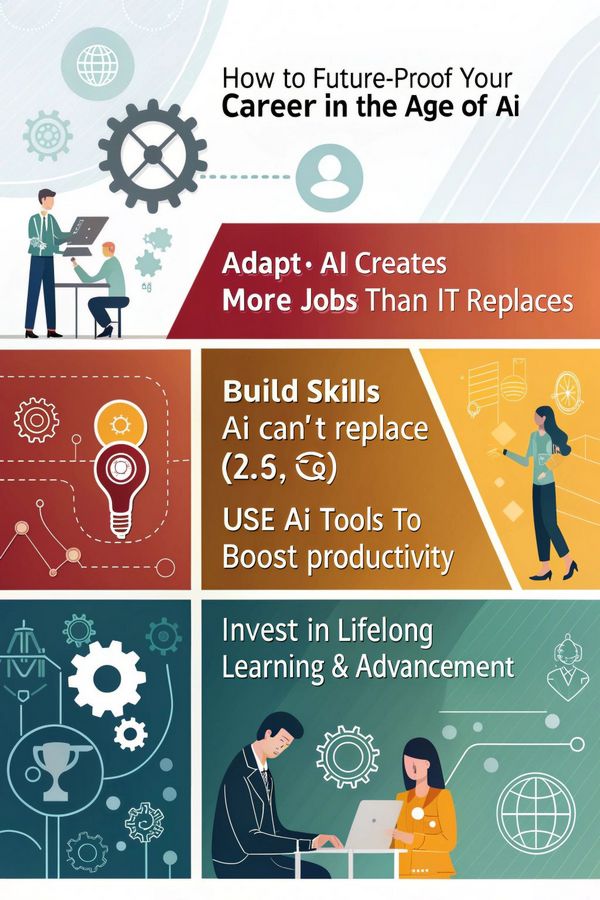AI is changing jobs fast. Many people worry about losing their roles to machines. You might question if your career is secure or how to maintain an advantage.
Here’s the good news: AI doesn’t just remove jobs—it creates new ones too. In 2020, it eliminated 1.8 million jobs but introduced 2.3 million more worldwide.
This post will guide you on how to adjust and succeed in this evolving work landscape with AI. Keep reading—you’ll find practical ways to get ready today!
Understanding AI Impact on Careers
AI is changing jobs fast. Some roles are shifting, while others might disappear altogether.
Knowledge Workers and Professionals
Knowledge workers and professionals face new challenges due to AI. Jobs in areas like finance, law, and marketing are changing fast. AI handles data-heavy tasks quickly, replacing repetitive work.
In 2020, while 1.8 million jobs were lost to automation, 2.3 million new roles emerged, showing opportunity alongside disruption.
Skills like critical thinking and problem-solving will keep these workers valuable. Machines struggle to imitate emotional intelligence and creativity—focus on these strengths. Use AI tools to boost your own efficiency rather than fearing replacement by them.
Adapting now ensures long-term job security in this shifting workplace landscape.
Creative Professionals
Creative jobs like writing or designing need human skill. AI tools can help, but they cannot replace original ideas. Use AI to make work faster and better. For example, writers can use it for research, while artists might use it for color choices.
In 2020, new tech removed 1.8 million jobs but added over 2.3 million more worldwide—a net gain of half a million roles! Stay creative by focusing on emotional intelligence and problem-solving skills.
These are hard for machines to copy.
Strategies to Future-Proof Your Career
Adapt to changes quickly and stay open to new ideas. Build skills that make you valuable in any workplace.
Continuous Learning
Continuous learning keeps your skills sharp. It helps you stay relevant as AI changes jobs and industries.
1. Stay curious every day
Read news about artificial intelligence and technology trends. Follow updates in your field to know what’s changing fast.
2. Take online courses often
Platforms like Coursera or LinkedIn Learning offer AI-related classes. Study data analysis, machine learning, or other technical skills to boost your career.
3. Update soft skills regularly
Practice problem-solving or critical thinking. Machines can’t replace talents like creativity or emotional intelligence.
4. Join hands-on workshops
Attend seminars focused on AI tools or automation technology. Gain practical experience by applying new methods to work tasks.
5. Ask for feedback from peers
Collaborate with coworkers to improve your abilities faster. Peer reviews can help you identify areas needing growth.
6. Build small personal projects
Use artificial intelligence to automate simple tasks at home or work. For example, try creating a chatbot or analyzing data trends yourself.
7. Welcome challenges openly
Volunteer for projects involving new technologies at work. Exploring unfamiliar areas will prepare you for bigger opportunities soon.
8. Dedicate time weekly for reading tech books
Books about AI basics can explain complex ideas simply (like “AI Superpowers” by Kai-Fu Lee). These resources teach how AI impacts industries worldwide.
9. Attend local networking events frequently
Meet industry leaders who share insights on their AI journeys during talks and meetups near you.
10. Stay adaptable to rapidly shifting skill demands
Focus energy on adjusting quickly through lifelong practice—even if the changes feel overwhelming initially!
Experimentation and Innovation
Trying new ideas and creating fresh solutions can make your career strong. Use AI to experiment and think creatively in your work.
- Test AI tools to improve daily tasks. For example, use machine learning tools for data sorting or automate scheduling with AI calendars.
- Solve problems in different ways. AI can help analyze options quickly, saving time while you explore creative solutions.
- Build new skills with online AI training platforms like Coursera or Udemy. These platforms help you stay competitive in the job market.
- Create innovative projects using AI insights. For instance, marketers can use AI to study trends and design unique campaigns.
- Partner with others on bold ideas that combine human creativity and technological power.
- Regularly reflect on how AI impacts your field since industries change quickly due to automation growth.
- Propose using AI at work for growth goals like improving customer reports through smarter chatbots or predictive insights.
- Develop better products by testing customer feedback faster with technologies supported by artificial intelligence systems today!
Collaboration
Work with others to stay ahead in your career. AI may replace some tasks, but teamwork and human connection remain valuable. Share ideas and solve problems together. Use AI tools to improve team projects.
For example, AI can help you plan resources or analyze data for group decisions.
Focus on emotional intelligence to build better relationships at work. Machines can’t match human empathy or understanding. Build trust by listening and supporting teammates. Collaboration makes you more adaptable and harder for automation to replace.
Ethical Frameworks
Build your career with ethical choices as AI grows. Use AI to help others while avoiding harm. Focus on skills like emotional intelligence and critical thinking—machines can’t replace these.
In 2020, AI created 500,000 more jobs than it took away, showing its potential is not just destructive but transformative.
Companies value fairness and trust, so align your work with these ideas. For example, use AI tools responsibly in marketing or hiring without bias. Build a futureproof career by staying fair and tech-savvy at the same time!
Adaptability
Adapt to changes fast. AI is transforming jobs everywhere. In 2020, it reduced 1.8 million jobs but generated 2.3 million new ones, resulting in a gain of 500,000 jobs. Those who refine their skills quickly remain ahead in this transition.
Concentrate on essential areas like emotional intelligence and problem-solving—machines find these tasks challenging. Utilize AI tools as assistants to enhance your work instead of fearing replacement.
Stay open to adjustments in your job and embrace acquiring new methods or roles as needed.
Practical AI-Related Tips for Career Advancement
 Start using AI tools to make your work more efficient. Keep an eye on how AI changes your industry to stay ahead.
Start using AI tools to make your work more efficient. Keep an eye on how AI changes your industry to stay ahead.
Start Using AI Today
Use AI tools to make your work easier. For example, use apps like Grammarly for writing or Tableau for data insights. These tools save time and boost quality.
AI can also help you plan better. Use it to outline goals, manage tasks, or organize data quickly. Stay ahead by letting technology handle repetitive jobs while you focus on creativity and strategy!
Stay Informed About AI Developments in Your Field
Follow AI news and trends in your industry. Companies often use AI to replace repetitive tasks, but it also creates new roles. For example, in 2020, AI led to a net gain of 500,000 jobs worldwide.
Stay updated to know how these changes may affect job security or open up opportunities.
Track tools that can help you work smarter. Many industries now use AI for data analysis and project planning. These tools can boost productivity and make your skills more valuable.
Knowing the latest tech keeps you ahead of shifting employment trends caused by automation.
Review Your Daily Tasks and Identify AI Opportunities
AI can assist with numerous tasks, saving time and simplifying work when used effectively.
1. Write down your daily activities
List all tasks performed at work, such as handling emails, entering data, conducting research, or scheduling appointments.
2. Identify repetitive tasks
Tasks that occur frequently are perfect for automation. For instance, AI tools can handle email organization or generate basic data reports.
3. Pinpoint areas for faster efficiency
Identify sluggish processes that consume excessive time. Tools like ChatGPT can speedily craft text or condense information.
4. Evaluate tasks needing data analysis
Jobs dealing with extensive data can benefit from machine learning tools. Analyzing customer trends, for example, is a task where AI excels.
5. Recognize creative assistance opportunities
Creative professionals can use AI to generate initial drafts for designs, slogans, or articles—saving time while refining their projects later.
6. Consider communication support options
AI chatbots boost customer service by managing simple inquiries around the clock, allowing employees to focus on more challenging tasks.
7. Implement prediction tools in planning
For long-term strategies or assessing risks in marketing and sales, AI offers superior pattern prediction compared to manual analysis.
8. Boost accuracy with automation
AI minimizes errors in repetitive or detailed work, such as updating spreadsheets or managing inventory records.
9. Ask colleagues about AI experiences
Learn how coworkers use AI in their roles—graphic designers, for example, leveraging Canva’s intelligent features—and explore tools applicable to your work.
10. Experiment with new tools often
Try software like Grammarly to quickly enhance writing quality and remain informed about advancements in technology!
Become an AI Pioneer and Advocate
Lead your workplace in adopting AI tools. Show how these tools save time and boost results. People who embrace AI early often stay ahead.
Talk about ethical use of AI. Teach others about its pros and cons. Share ideas on using it wisely to make work smarter, not harder.
Read This Also: Side Hustles That Pay Big: Turning Passion Into Profit
Invest in AI Education and Training
AI is shaping jobs quickly. In 2020, it reduced 1.8 million jobs worldwide but generated 2.3 million new ones. This shift highlights the value of AI skills for job security and career growth.
College students and workers should focus on building skills like data literacy and problem-solving to stay ahead.
Take courses online or join workshops about AI tools and basics of machine learning. Use free resources like videos or articles to expand your knowledge daily. Companies also value employees who understand how to apply AI in tasks like analyzing data or creating better plans more efficiently than before.
Continue gaining knowledge—it’s the best way to future-proof your career in this digital age!
Plan B: Exploring AI-Resilient Careers

Sometimes, jobs are safer from AI changes. These careers rely on human skills that machines can’t replace easily.
Healthcare Providers
Healthcare jobs are less likely to face automation. AI can assist doctors and nurses but cannot replace them. Emotional intelligence and critical thinking remain key in this field.
In 2020, while AI altered many industries, it created roles that required human empathy, like caregiving.
Skills like adaptability and emotional intelligence help secure careers here. Focus on tasks machines struggle with, such as understanding patients’ emotions or complex problem-solving in emergencies.
Investing in health education also prepares you for long-term job security despite AI advances.
Education and Training
Education roles will remain significant as AI expands. Teachers, trainers, and mentors develop skills in others that machines cannot easily replicate. Emotional intelligence and adjusting lessons for various needs make these professions essential.
Spending time in training careers helps secure future work opportunities. Many industries now require professionals to instruct workers on using AI tools. This change increases the demand for educators and trainers knowledgeable about technology trends such as machine learning or automation.
Social Services
Social services jobs are less likely to face automation. AI struggles to replace empathy, emotional intelligence, and human connection. Skills like critical thinking and problem-solving are key here.
Workers in this field can adapt by understanding how AI supports their roles.
AI tools can assist in managing resources or improving service delivery. For example, caseworkers might use it to track patterns or predict client needs. Professionals who welcome these changes will stay ahead while maintaining the human touch that machines cannot replicate.
Technical and Engineering Fields
Technical jobs remain resilient against AI changes. Engineers address problems and develop tools, a role machines cannot completely take over yet. In 2020, AI eliminated 1.8 million jobs but created 2.3 million new ones—engineers play a significant role in building these systems.
AI also enhances engineers’ efficiency and reduces errors. Acquire coding or data skills to maintain a competitive edge in this field. Emphasize critical thinking and problem-solving abilities—areas where machines face challenges.
Strengthen emotional intelligence as well; collaboration continues to be essential in projects!
Conclusion
AI is here, and it’s transforming jobs rapidly. Stay curious, continue expanding your knowledge, and adjust to new tools. Concentrate on skills that machines cannot completely replicate like creativity and empathy.
View AI as an assistant, not a danger. The future of your career begins with the actions you take today!
Frequently Asked Questions (FAQs)
1. What does it mean to future-proof your career in the age of AI?
It means preparing yourself to stay valuable and adaptable as AI tools change how we work. You focus on skills that machines can’t easily replace, like creativity and problem-solving.
2. How can I make my job secure when AI is advancing so fast?
Learn new skills often—especially ones related to technology or working with people. Stay curious, take online courses, and keep up with trends in your industry.
3. Will AI take over all jobs someday?
Not all jobs! While AI might automate repetitive tasks, many roles still need human thinking, ideas, or personal connections (like teaching or healthcare). The key is staying flexible.
4. What should I focus on learning for a future-proof career?
Pay attention to tech-related skills like coding or data analysis—but don’t skip soft skills either! Communication, teamwork, and leadership will always matter no matter how advanced machines get.

